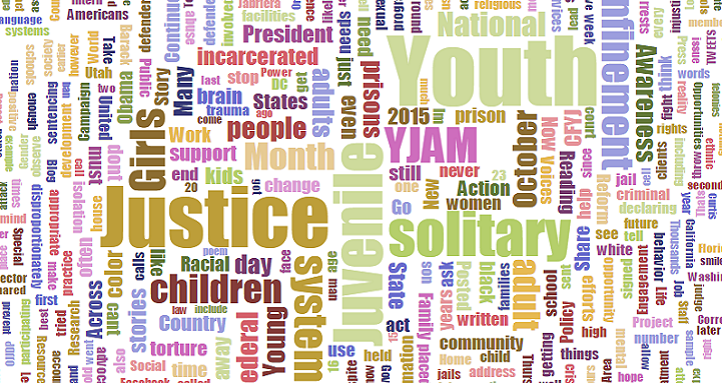
The balloon launch at the end of a strenuous 200+ mile “Journey for Justice” bike ride across Missouri was symbolic as much as it was ceremonial. Tracy Wade McClard launched Youth Justice Awareness Month (YJAM) in memory of her son, Jonathan, who took his life when he was incarcerated as an adult at age 17. Seven years later—YJAM has grown exponentially and Tracy’s fight to end the prosecution of youth as adults continues. As the balloons released, so did the stories of the hundreds and thousands of youth who have been tried, sentenced and incarcerated in the adult criminal justice system.
Throughout October, youth, communities, advocates and policymakers from 23 states in 70 events have shared stories of youth in the adult criminal justice system, because the first step to change often begins with the power of a story. Stories this month culminated across four major themes—the adolescent brain, racial and ethnic disparities, solitary confinement, and family engagement. Stories relayed through poetry, video, research, and art highlighted the need for change.
· Dr. Abigail Baird from Vassar College shared the research on brain science, “We prohibit young people from engaging in a whole host of things because we feel that they lack the maturity to fully grasp the potential consequences of their actions. In spite of this, we support the idea that an adolescent who commits a violent act has somehow overcome the well-known cognitive and behavioral limitations of their age and should now, in the eyes of the court, been seen as an adult.”
· A young man who has been incarcerated as an adult since he was 16 wrote : “In many ways, I was raised in the prison system. I first learned to shave in the county jail at 16, A 65-year old crack dealer showed me how. I learned to tie a tie at age 27, and my boss, a cool sergeant, showed me how it was done. I grew up in here, and I am fortunate that I was taken in by older guys who were positive people. It could have been worse for me, and for many children now entering our prisons, it is worse. “
· Public defenders across the country shared stories of racial and ethnic disparities in the system, “My job is to fight for [them]. Little do they suspect that when I say fight, I don’t just mean the battle that is their case, but the larger war against racial injustice.”
· Reverend Laura Downton called upon the stories of the 80-100,000 youth and adults housed in solitary confinement each day, “To address the moral crisis of solitary, we must affirm that there are no throw away people, and no throw away children. Where cycles of trauma persist, we need interventions that lead to restoration and life. Children should never be placed in solitary confinement. And our young people should not be subjected to confinement in jails and prisons designed for adults. We owe their future, the future God dreams for each of them, an opportunity to flourish.”
· Family member, Keela Hailes, shared her story as a parent, “In my eyes, my son went from a sixteen-year-old-child to a thirty-year-old-man overnight, absent the completed brain development. In his own eyes, he had no other choice but to go from a child to a man overnight to cope with his new surroundings. He served out his sentence, came home and tried to be a productive member of society; however, two years later, he reoffended and was sent back to jail. I believe kids should be held accountable and am advocating for common sense measures that hold youth accountable and give them an opportunity to rehabilitate. Studies have shown us that this can, and should happen in the juvenile justice system.”
Stories prompt us to take action.
President Barack Obama signed a proclamation this month declaring October 'National Youth Justice Awareness Month' and called on Americans to "observe this month by getting involved in community efforts to support our youth, and by participating in appropriate ceremonies, activities, and programs."
Policy makers on every level joined his call—state governors also issued proclamations in support of YJAM—including Governor Gary Herbert of Utah and Governor Rick Snyder of Michigan. So did Mayor Ashton Hayward of Pensacola, Florida .
Members in the US House of Representatives held a hearing on juvenile justice, and the US Senate saw the introduction of the Sentencing Reform and Corrections Act of 2015, a bill that would limit solitary confinement for youth in federal custody, allow for expungement of certain federal crimes committed as youth, and allow for sentencing review for youth sentenced in the federal system to life without parole.
States filed legislation this month to reduce the number of youth prosecuted as adults in Wisconsin (Assembly and Senate), Florida (House and Senate) and Michigan.
As we close out October, I leave you with the call to action from youth advocate, Morehouse Student, and formerly incarcerated youth, Alton Pitre, “As fellow caring human beings and advocates for justice, now is the time to challenge ourselves to get involved in this movement. We must use our personal stories and experiences to change the minds and hearts of those in power. Our children deserve to be treated like the children they are.”